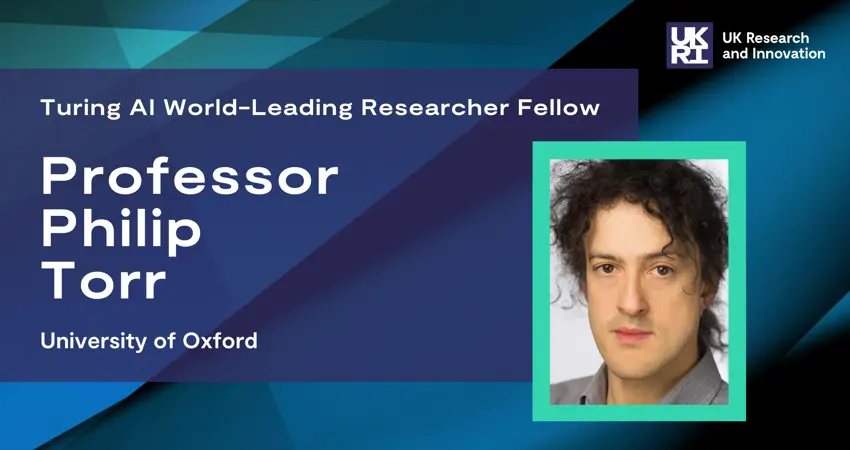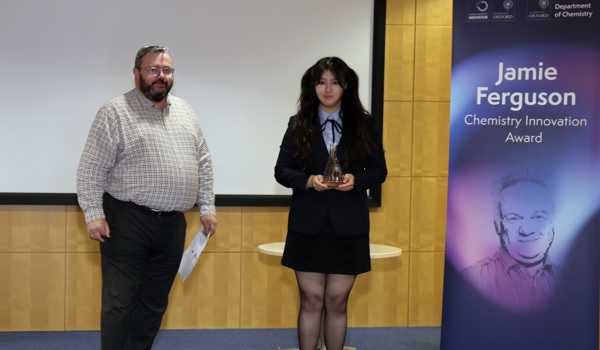30 Jul 2021
Professor Philip Torr named by UKRI as one of five Turing AI World-Leading Researcher Fellows
Fellowship aims to make deep neural networks, a form of AI used in applications from autonomous vehicles to medical diagnosis, more robust and less vulnerable to malicious interference

Professor Philip Torr is one of five internationally-recognised researchers appointed as the first Turing AI World-Leading Researcher Fellows to conduct ground-breaking work on Artificial Intelligence’s (AI) biggest challenges.
The fellowships, named after AI pioneer Alan Turing, are part of the UK's commitment to further strengthen its position as a global leader in the field. Retaining and attracting some of the best international research talent in a highly competitive international environment will increase the UK’s competitive advantage and capability in AI.
The fellows’ research will have a transformative effect on the international AI research and innovation landscape by tackling some of the fundamental challenges in the field. It could also deliver major societal impact in areas including decision-making in personalised medicine, synthetic biology and drug design, financial modelling, and autonomous vehicles.
The fellows’ research will have a transformative effect on the international AI research and innovation landscape by tackling some of the fundamental challenges in the field.
Professor Torr is a Fellow of the Royal Society and of the Royal Academy of Engineering, and founder of spin-outs Oxsight and AIstetic. He aims to make deep neural networks more robust. Deep networks are widely used in applications from fraud-detection to self-driving cars but also have surprising vulnerabilities.
Through his fellowship Professor Torr will create a new Centre of Excellence to make deep learning reliable, robust and deployable as well as capable of efficiently handling the enormous quantities of data they will be fed with.
"I aim to make deep neural networks, a form of AI that is ever more ubiquitous in technologies such as autonomous vehicles and medical diagnosis, more robust and less vulnerable to adversarial interference"
He says, “These fellowships are emblematic of the ground-breaking AI research taking place in the UK and offer an opportunity to address long-standing challenges in the field. Through my fellowship I aim to make deep neural networks, a form of AI that is ever more ubiquitous in technologies such as autonomous vehicles and medical diagnosis, more robust and less vulnerable to adversarial interference. Doing so will provide further protection for these systems against malicious agents, and help to realise their full, transformative potential.”
Government Chief Scientific Adviser, Sir Patrick Vallance, commented: “These five internationally-recognised researchers appointed as the first Turing AI World-Leading Researcher Fellows will help enable us to attract top talent from across the globe and ensure that the UK stays at the forefront of AI research and innovation. This expertise will increase the UK’s capabilities in AI and equip us to face greater and more complex challenges.”
"This expertise will increase the UK’s capabilities in AI and equip us to face greater and more complex challenges.”
The fellows are supported with a £18 million investment by UK Research and Innovation (UKRI). The fellowships are being delivered by UKRI’s Engineering and Physical Sciences Research Council. EPSRC Executive Chair, Professor Dame Lynn Gladden, said: “The Turing AI World-Leading Researcher Fellowships recognise internationally-leading researchers in AI, and provide the support needed to tackle some of the biggest challenges and opportunities in AI research. These fellowships enable the UK to attract top international talent to the UK as well as retaining our own world-leaders. Attracting and retaining top talent is essential to keep the UK at the leading edge of AI research and innovation.”
The 4 other new fellows are:
- Professor Zoubin Ghahramani, University of Cambridge
- Professor Samuel Kaski, The University of Manchester
- Professor Mirella Lapata, University of Edinburgh
- Professor Michael Wooldridge, University of Oxford
Follow Vision Group on Twitter @OxfordTVG




